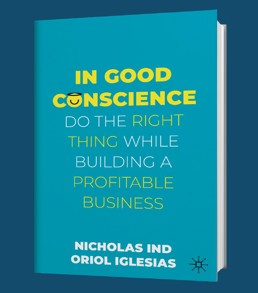Why Sustainability needs a Conscience
-
Sist oppdatert
17. januar 2023
-
Kategori
-
Tema
- Sustainability
- Consciousness
- Profit
- Greenwashing
-
Sist oppdatert
17. januar 2023
-
Kategori
-
Tema
- Sustainability
- Consciousness
- Profit
- Greenwashing
How to do the right thing while making a profit.
KNOWLEDGE @ KRISTIANIA: Sustainability
Companies lack expertise on sustainability, fail to prioritise climate change and lack the commitment to drive environmental and social commitments into the core of the business. Why?
Most business managers understand the importance of sustainability. However, their level of engagement is often superficial. External pressures from consumers and legislators, alongside a desire to be admired, encourage the narcissism that can be witnessed in sustainability reports which hide inconvenient truths and gloss over failings.
What is required is an approach that is rooted in conscience.
Conscience comes to life when purpose and principles are used in contexts where choices are made.
Conscience is a belief system which drives good acts
There may be people with Sustainability titles and there may be an office door somewhere with Corporate Social Responsibility on it, but you are unlikely to find individuals with the title Conscience Manager.
Conscience is an idea with a long history. It is essentially a belief system rooted in experience, knowledge and reflection that involves awareness of others, which drives morally good acts. It both guides decisions and provides a point of accountability for choices made.
To make conscience explicit and usable, a company has to put its belief system into words. It must use concepts such as purpose - what the company seeks to achieve in the world - and principles - the fundamental tenets that guide acts. This is not exactly conscience, which is ineffable and irreducible, but is rather a proxy for it.
Conscience comes to life when purpose and principles are used in contexts where choices are made. It can drive business strategy and operations in a way that delivers social, environmental and economic value. The formula we use to explain this role of conscience is:
Conscience = critical thought + acting together to effect change.
Conscience is opportunity and obligation
This means assembling with an open mind, the best insight on a given issue and reflecting critically on it. It requires the ability to distinguish fact from opinion. Second – and linked to the first part of the formula – is an awareness of the world and our common humanity that should enable us to step over narrow interests and to understand, empathise and work with others to create meaningful change.
Thus, conscience is active, not passive. It is not simply about reacting to events. It is rather taking a proactive role to ensure that conscience is used to make key decisions and to guide sustainability strategies and corporate social responsibility programmes. As Wiebe Draijer, CEO of Rabobank, argues about the role of the bank in the world, ‘conscience has led to the conviction we have an opportunity, but also an obligation to sometimes bring about system change.’
Conscience in action
Many of the organizations we researched have conscientious roots. Companies like fashion brand, Ecoalf with its commitment to recycled fabrics, anti-slavery campaigner Tony’s Chocolonely, retailer, John Lewis Partnership with its belief in democracy at work and passionate environmentalist Patagonia were founded on a cause.
Yet, others, such as Britain’s largest supermarket, Tesco, have little in their pasts, that indicate anything other than a whole-hearted pursuit of profitability. Yet, Tesco is fascinating. It is typical of much of the commercial business landscape in its faltering journey from shareholder primacy and a focus on sales figures to a more conscientious and longer-term approach. Look at media commentary and you can find plenty of criticism of its environmental and social policies. But you can also see that the same energy that drove Tesco’s rapid business expansion, is now being used to transform its approach to sustainability.

Book by Nicholas Ind and Oriol Iglesias
Do the right thing – and profit
Is there reason to be optimistic about corporate commitments to sustainability? There is certainly plenty of greenwashing around with companies talking up their achievements without fully supporting their claims with action. But there are also businesses both large and small that have moved sustainability to the core. They argue that sustainability is only realizable when it is driven by a conscientious commitment to delivering transformative change.
Demonstrating such commitment is not without its tensions. Companies must balance short and long-term goals, as well as work through the economic and moral costs of actions on different stakeholders. However, acting in good conscience reaps benefits in terms of creating firms that people want to work for, invest in and buy from.
It is possible to do the right thing and be profitable at the same time.
References:
Ind, Nicholas, and Iglesias, Oriol (2022). In Good Conscience: Do the right thing while building a profitable business, Palgrave.
Vi vil gjerne høre fra deg!
Send spørsmål og kommentarer til artikkelen på e-post til kunnskap@kristiania.no.

Meld deg på vårt nyhetsbrev
N1

Ny teknologi avslører grønnvaskede klær
Med ny teknologi kan vi gå moteindustrien etter i sømmene. Det kan hjelpe kleshungrige forbrukere til å ta bevisste, klimavennlige valg.Les mer
Consumers expect brands to take a stance on key issues
Managers cannot not take a stance on key issues. Consumers and other stakeholders increasingly expect brands to take a lead on sociopolitical issues.Les mer
N2

Nudging er en dult i riktig retning. Men det kan også misbrukes.
Mennesker er ikke bare kalkulerende fornuftsvesener. Det åpner for en type påvirkning vi ikke alltid merker – «nudging».Les mer
Smarte kontrakter kan hindre grønnvasking
Smarte kontrakter i kombinasjon med blokkjedeteknologi kan hjelpe forbrukere til å ta informerte og bærekraftige valg. Det vil kunne forhindre grønnvasking.Les mer



